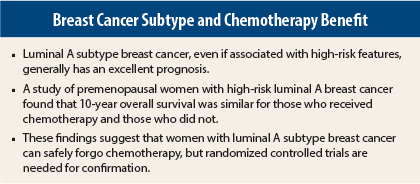The ability to classify breast cancer according to biologic subtype has enabled researchers to dig deeper and determine which therapies benefit specific subgroups. Encouraging evidence from an analysis of a Danish trial presented at the 2015 San Antonio Breast Cancer Symposium suggests that patients with luminal type A breast cancer can safely forgo chemotherapy.1
“A large body of evidence suggests that luminal type A breast cancer has the best prognosis of all breast cancer subtypes. It has been difficult to do randomized trials without offering women with breast cancer adjuvant chemotherapy, because we know it helps them. We need prospective randomized trials to establish that these low-risk women do not need chemotherapy,” explained lead investigator Torsten O. Nielsen, MD, PhD, Professor in the Department of Pathology and Laboratory Medicine at the University of British Columbia, Vancouver, Canada.
Dr. Nielsen and colleagues performed a test of interactions between chemotherapy benefit and breast cancer subtypes based on women treated in a phase III randomized trial of chemotherapy vs no chemotherapy. “This is the best way to test whether intrinsic breast cancer subtype predicts the value of chemotherapy,” he said.
DBCG77B Trial
The investigators used tissue samples from the Danish Breast Cancer Cooperative Group 77B (DBCG77B) trial of 1,146 premenopausal women with node-positive, high-risk breast cancer with any hormone receptor or HER2 status. High-risk features included tumors of 5 cm or greater or node-positive status; hormone receptor and HER2 status were not ascertained because in 1977, when the trial was started, this was not standard of care.
In the DBCG77B study, all women received standard treatment (for 1977): mastectomy plus axillary node dissection plus radiation. They were then randomly assigned to one of two no-chemotherapy arms (receiving levamisole [Ergamisol] or no agent), or one of two chemotherapy arms (receiving single-agent cyclophosphamide or combination therapy with CMF [cyclophosphamide, methotrexate, and fluorouracil]). Both cyclophosphamide and CMF improved 10-year disease-free survival and 25-year disease-free survival.
Prospective-Retrospective Analysis
For the present study, an interaction test was conducted between luminal A status and chemotherapy for the trial’s primary endpoint of 10-year disease-free survival. “This was a formal prospective-retrospective study,” Dr. Nielsen noted.
Tissue staining of archival samples enabled scoring and subtyping by pathologists; then intrinsic subtyping was performed by tissue microarray. Luminal A subtype was defined as in previous publications as estrogen receptor–positive, HER2-negative, progesterone receptor > 20%, and Ki67 proliferation index < 14%. Of 633 immunohistochemistry-analyzed samples, 165 were identified as luminal A subtype.
The main finding was that luminal A patients had similar 10-year disease-free survival with and without chemotherapy regardless of whether they were node-positive and not on hormonal therapy, whereas non–luminal A patients were 50% more likely to survive disease-free at 10 years if they were treated with chemotherapy. The interaction between chemotherapy and luminal A/non–luminal A subtypes was significant (P < .05).
Dr. Nielsen acknowledged several caveats about this trial. The immunohistochemistry method has limited analytic validity as a clinical test, and this was a tissue microarray study on blocks recollected for gene-profiling analysis. Moreover, this was an older trial, in which patients did not receive modern treatments such as endocrine therapy, anthracyclines, or taxanes.
Nonetheless, he told The ASCO Post, “This study extends the body of evidence showing that women with low-molecular-risk breast cancers do not benefit from aggressive therapy.” That being said, larger prospective studies are needed to change practice in this regard. ■
Disclosure: Dr. Nielsen has disclosed royalties and receipt of intellectual property rights and consulting fees from NanoString Technologies as well as ownership interest in Bioclassifer LLC.
Reference
1. Nielsen TO, Jensen MB, Gao D, et al: High-risk premenopausal luminal A breast cancer patients derive no benefit from adjuvant chemotherapy: Results from the DBCG77B randomized trial. 2015 San Antonio Breast Cancer Symposium. Abstract S1-08. Presented December 9, 2015.



